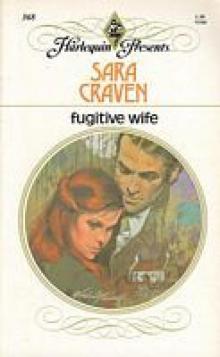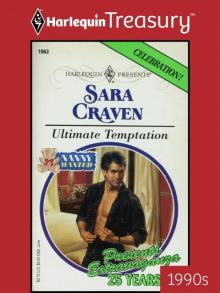- Home
- Sara Craven
His Reluctant Bride Page 2
His Reluctant Bride Read online
Page 2
The man who told me that I’d become an inconvenience, and that it would be much safer for me to quit my job and go back to England.
And that I should never try to contact Sandro, or come back to Italy again—ever.
In return for which I was to receive the equivalent of fifty thousand pounds.
Polly shuddered. Even now the memory made her shake inside. But what had crucified her then, and still hurt today, was that Sandro hadn’t had the guts to come to her himself—to tell her in person that it was finished between them. And why …
She’d rejected his money with anger and contempt, unable to believe that he could insult her like that. Ordered his confederate out of her room.
But, all the same, she’d obeyed and left, because she was too heartbroken—and also too frightened to stay. She didn’t know what Sandro could be involved with to afford a bribe of that size—and she didn’t want to know. But something had reached out from the shadows around him, which had touched her life, and destroyed her hope of happiness.
She had been at home for several weeks before it dawned on her that she was pregnant—a knowledge born slowly from grief, bewilderment and unbelievable loneliness. At first she’d told herself that it could not be true—that they’d always been so careful—except for one night when their frantic, heated need for each other had outweighed caution.
And that, she had realised, stunned, must have been when it happened. Another blow to deepen the agony of pain and betrayal. Yet, although the prospect of single-motherhood had filled her with dread, she’d never once considered the obvious alternative and sought an abortion.
Her mother had thought of it, of course. Had urged her to do it, too, cajoling one minute, threatening the next. Railing at Polly for her stupidity, and for bringing shame on the family. Swearing that she would have nothing further to do with her daughter or the baby if the pregnancy went ahead. A resolution that had lasted no longer than an indrawn breath from the moment she had seen her newborn grandson.
Charlie had instantly taken the place of the son she’d always longed for. And there’d never been any question about who was going to look after him when Polly recovered and went back to work.
But, as Polly ruefully acknowledged, the arrangement had become a two-edged sword. Over the months, she seemed to have been sidelined into playing an elder sister’s role to Charlie. Any slight wail, bump or graze brought her mother running, leaving Polly to watch helplessly while Mrs Fairfax hugged and comforted him. And that was not good.
She had to admit that her mother had not been too wide of the mark when she’d described Polly’s flat as an attic. It had a reasonable-sized main room, a basic bathroom and a minuscule kitchen opening out of it, plus Charlie’s cubby-hole. Polly herself slept on the sofa bed in the living room.
But she couldn’t deny it was a weary climb up steep and badly lit stairs to reach her front door, especially when she was encumbered with Charlie, his bag of necessities and his buggy, which she didn’t dare leave in the entrance hall in case it was stolen.
Once inside, she kept her home space clean and uncluttered, the walls painted in cool aqua. Most of the furniture had been acquired at auction sales, including the sofa bed, for which she’d bought a new cover in an Aztec print of deep blue, crimson and gold.
It wasn’t flash, but the rent was reasonable, and she always felt the place offered comfort and a welcome as she went in.
And tonight she was in sore need of both.
It was a warm evening, so she unlocked the living-room window and pushed up the lower sash, sinking down onto the wooden seat beneath. There was some cold chicken and salad in the fridge, and it would be a moment’s work to put a potato to bake in her second-hand microwave.
But she was in no hurry to complete her supper preparations. She felt tired and anxious—and more than a little disheartened. It seemed strange not to hear the clatter of Charlie’s feet on the stripped boards as he trotted about, or his incessant and often unintelligible chatter.
She missed, too, his sudden, unsteady gallop to her arms. That most of all, she thought, her throat tightening.
I should have brought him home, she told herself restlessly, and not let myself be out-manoeuvred like that.
She felt, she realised, totally unsettled, for all kinds of reasons, so maybe this would be a good time to review her life, and see if she needed to make some changes.
And, first and foremost, she needed to be able to spend more time with Charlie.
When she began working again, after he was born, Safe Hands had seemed ideal, more of a career choice than an ordinary job. Having her cake, and eating it—or so she’d thought then.
She had been able to go on with the travelling she loved, and, as well as her salary, the majority of the clients paid her a cash bonus as well. Even at London prices, she could afford to live, and provide Charlie with what he needed, although there was never much left over for extras.
But his needs were changing, and so, she realised, were hers.
For one thing, it wasn’t essential to work, or even live, in London. In fact, it would be sheer relief to be able to say goodbye to those stifling journeys on the underground and buses.
She could move to a totally different area altogether, away from the south-east of England. Deliberately select a place where it would be cheaper to live, and find a job in local tourism. Something strictly nine-to-five, with no time away from home, so that she could spend her leisure hours with her son.
During the day she’d need a minder for him, of course. There was no way out of that. But she’d look for someone young and lively, caring for other children too, so that Charlie would have playmates. Maybe, in time, she could even get a foot on the housing ladder—find somewhere small and manageable, hopefully with a garden. Something she would never be able to afford in London.
She would miss this flat, she thought, sighing, and it would be a wrench leaving Safe Hands but reason was telling her it would be for the best.
I have, she thought, to make a life for us both. For Charlie and myself. I need to build a proper relationship with him. And I can’t do that if we stay here. Because I won’t be allowed to.
But she wasn’t delusional enough to think she could strike out on her own without a struggle, she told herself, wrinkling her nose. Her mother would fight her every step of the way, coming up with every possible reason why she should not do this thing—and a few impossible ones, too.
And when she saw Polly could not be moved, she would be very bitter. There might even be an open breach between them.
But that won’t last forever, she thought. Whatever Mum thinks of me, she’ll still want to maintain contact with Charlie.
She got to her feet. She would eat now, and when supper was over she’d use her laptop to go internet-exploring, looking at house prices in different parts of the country. Now that she’d made up her mind, there was no time to be lost.
Strange, she thought, how I can suddenly be so sure of that.
Yet the pressure on her to accept the Italian assignment must have contributed to her decision. It had left her feeling uneasy—and awoken too many bad memories.
A clean break with the past was what she needed. New job—new home—new friends.
She would never be able to forget, of course, that Sandro was Charlie’s father. But in time, it might begin to hurt less. And she might even be able to stop being afraid. One day.
‘See Naples and die, eh?’ The man in the adjoining seat emphasised the originality of his remark with a slight dig in Polly’s ribs, as their plane descended towards Capodichino Airport. ‘That’s what they say, isn’t it?’
Polly gritted her teeth as she gave a wintry smile in acknowledgement.
But I don’t care what ‘they’ say, she told herself fiercely. Naples is going to be my jumping-off point for a whole new life. And I plan to live every moment of it.
She couldn’t say she’d enjoyed the flight. The contessa might need her
physical assistance, but she certainly hadn’t wanted her company. Which was why she was seated in first class, while Polly herself was in economy, with a neighbour who considered her presence his personal bonus.
Never mind, she thought. In a few moments I’ll never have to see him again, or the contessa either.
She’d sipped mineral water throughout the flight, in spite of her fellow traveller’s unceasing efforts to buy her what he called a proper drink. And the irony was that she’d have welcomed some alcohol, to dispel the shaky chill which had settled in the pit of her stomach. The closer they had got to their destination, their progress cheerfully marked by the captain, the more nervous she’d become.
I shan’t relax until I’m safely back in Britain, she thought.
On the surface, she was calmness itself. She was wearing the company uniform of a slim-fitting, button-through dress in navy linen, with the distinctive silver brooch showing a pair of clasped hands pinned to her left shoulder. Her pale hair was in a loose knot on top of her head, and she wore her usual dusting of powder, and soft pink lipstick.
As they touched down, and the plane began to taxi to its stand, Polly reached under the seat, and extracted the navy leather satchel which held the travel documents and a few basic necessities in case of delay. Her client, she was sure, would have an eagle eye for the slightest lapse in efficiency.
Her companion nudged her again. ‘Dangerous city, they say,’ he whispered. ‘If you’re on your own tonight, I’d be happy to show you around.’
‘Tonight,’ she told him, ‘I intend to be back in London.’ And left him gaping.
Contessa Barsoli was a tall woman, rake-thin, with immaculately coiffed white hair and still handsome in a chilly way. A member of the cabin staff was permitted to help her descend the aircraft steps while Polly followed, instinctively lifting her face to the brilliant warmth of the southern sun.
Once inside the terminal, she found her charge a chair, retrieved her luggage and guided her through the formalities.
‘There has been a small change of plan,’ the older woman informed her abruptly. ‘I am too tired to undertake a long car journey down to the Campania, so my cousin has arranged a suite for me at the Grand Hotel Neapolitana. You will accompany me there.’
Polly knew resignedly that she shouldn’t be surprised. Most of the arrangements she’d made for the contessa during her stay in Britain had been subject to alteration, usually at the last moment. Why should this time be any different?
But this wasn’t just irritating, she reminded herself, schooling her expression. It was seriously inconvenient. She had a return flight to catch, and the contessa knew it.
‘Do you wish me to get us a taxi?’ she asked quietly. If she could find a driver who knew a few short cuts through Naples’ crowded streets, she might still be in with a chance.
‘A taxi?’ The contessa made it sound like a tumbrel. ‘My cousin has sent a car and chauffeur for us. Oblige me by finding him.’
That was easily achieved. Transferring the contessa and her luggage to the roomy depths of the limousine was a completely different matter. The lady liked to take her time, oblivious to Polly’s simmering frustration as the minutes ticked past.
The traffic was a nightmare, and when they did reach the hotel at last, Polly accepted that she probably wouldn’t make it back to the airport in time for her flight.
I haven’t a prayer, she told herself resignedly. It’ll take me half an hour to get her to the lift.
But to her astonishment, the contessa suddenly became quite sprightly. She conducted her own registration at the desk, waving Polly regally away, and made no fuss about the prompt unloading of her luggage.
An under-manager escorted her, bowing, to the lift, where Polly caught up with her.
She said awkwardly, ‘I need to say goodbye now, contessa, if I’m to get my flight.’
She got a severe look. ‘But I wish you to accompany me to the suite, signorina. I have ordered coffee and biscotti to be served there. Besides,’ she added, seeing that Polly was on the verge of protest, ‘there is still the question of the money I offered you. I do not conduct such transactions in the foyers of hotels. If you want to be paid, you will come with me now.’
Groaning silently, Polly stood beside her as the lift made its way upward. They emerged onto a crimson-carpeted corridor, opposite a heavily carved door.
The under-manager produced a key with a flourish, and unlocked the door, and, still bowing, showed them ceremoniously into the suite.
Polly found herself in a large drawing room, shaded by the shutters which had been drawn over the long windows to combat the force of the mid-June sunlight. She had a confused impression of brocaded sofas and fresh flowers in elaborate arrangements, their scent hanging languidly in the air.
And realised suddenly that the room wasn’t empty as she’d first thought. Because someone was there—someone standing by the windows, his figure silhouetted against the slatted light. Someone tall, lean and unforgettably—terrifyingly—familiar.
Even before he spoke, Polly knew who he was. Then his voice, low-pitched and faintly husky, reached her, and there was no longer room for any doubt. Or any hope, either.
He said, ‘Paola mia. So, you have come to me at last.’
He moved—came away from the window, and walked towards her with that long, lithe stride she would have known anywhere, his shadow falling across the floor as he approached.
She tried to speak—to say his name, but her trembling mouth could not obey her and shape the word.
Because this could not be happening. Sandro could not be here, in this room, waiting for her.
As he reached her, she cried out and flung up her bare and unavailing hands in a desperate effort to keep him at bay. Only to find the shadows crowding round her, welcoming her, as she slid helplessly downwards into the dark whirl of oblivion.
CHAPTER TWO
AWARENESS returned slowly, accompanied by an acrid smell that filled her nose and mouth with its bitterness, making her cough and mutter a feeble protest.
She lay very still, fighting against a feeling of nausea, hardly daring to open her eyes. Her senses told her that she was cushioned on satiny softness, and that she was not alone. That in the real world behind her closed eyelids, there was movement—people talking. And the heavy noise of traffic.
She propped herself dizzily on one elbow, and looked around her. She was lying in the middle of a vast bed, covered in deep gold embroidered silk. She was shoeless, she realised, and the top buttons of her dress had been unfastened.
The first person she saw was the contessa, as she stepped back, replacing the stopper in a small bottle. Smelling salts, Polly thought, dazedly. The older woman always insisted on having some handy in case travel motion upset her.
And, standing in silence a few yards away, was Sandro, head bent, his face in profile.
Not a figment of her imagination, as she’d hoped, but a nightmare that lived and breathed, and would not go away.
And not the laughing, dishevelled lover, wearing frayed shorts and an old T-shirt, and badly in need of a haircut, that she’d once known and desired so passionately, but that other, hidden man whose identity she’d never even suspected as she lay in his arms.
This other Sandro wore a dark suit that had clearly emanated from a great Italian fashion house. The dark curling hair had been tamed, to some extent at least, and there wasn’t a trace of stubble, designer or otherwise, on what she could see of the hard, tanned face, only a faint breath of some expensive cologne hanging in the air.
His immaculate white shirt set off a sombre silk tie, and a thin platinum watch encircled his wrist.
Whatever path he’d chosen to follow, it had clearly brought him serious money, Polly thought, anger and pain tightening her throat. And she didn’t want to contemplate how it might have been obtained. Who said crime didn’t pay?
Nor was he staying silent out of weakness, or any sense of guilt. Instinct told
her that. He was simply exercising restraint. Under the stillness, Polly could sense his power—and the furious burn of his anger, rigorously reined in. Could feel the violence of his emotions in the pulse of her blood and deep within her bones, just as she’d once known the naked imprint of his skin on hers, and the intimate heat of his possession.
As if, she thought with a sudden sick helplessness, she lived within his flesh. Part of him. As she had once been.
Now that the impossible had happened, and she was face to face with him again, she was shocked by the intensity of her physical reaction to him. Ashamed too.
She had to make herself remember the cruel brutality of his rejection. The cynical attempt to buy her off, and the explicit threat that had accompanied it.
She needed to remind herself of the abyss of pain and loneliness that had consumed her after she’d fled from Italy. And, most important of all, she had to get out of here, and fast.
She sat upright, lifting a hand to her head as the room swayed about her.
The movement riveted everyone’s attention, and Sandro took a hasty step forward, pausing when Polly flinched away from him involuntarily, his mouth hardening in an icy sneer.
‘No,’ he said. ‘It is not pretty. You should have been prepared in advance, perhaps. Warned what to expect.’
As he came closer, Polly saw his face clearly for the first time. Saw the jagged scar that had torn its way from the corner of his eye, across the high cheekbone and halfway to his jaw.
For a brief moment she was stunned, as shocked as if she had seen some great work of art deliberately defaced.
He looked older too, and there was a weariness in the topaz eyes that had once glowed into hers.
Oh, God, she thought, swallowing. He thinks that I find him repulsive, and that’s why I turned away just now.
A pang of something like anguish twisted inside her, then she took a deep breath, hardening herself against a compassion he did not need or deserve.
Let him think what he wanted, she thought. He’d chosen his life, and however rich and powerful he’d become he’d clearly paid violently for his wealth. And she’d been fortunate to escape when she did, and keep her own wounds hidden. That was all there was to be said.

 The Marchese's Love-Child (The Italian Husbands)
The Marchese's Love-Child (The Italian Husbands) Inherited By Her Enemy (HQR Presents)
Inherited By Her Enemy (HQR Presents) His Wedding-Night Heir (Wedlocked!)
His Wedding-Night Heir (Wedlocked!) The Token Wife
The Token Wife Mistress on Loan
Mistress on Loan Deceived (Harlequin Presents)
Deceived (Harlequin Presents) Fugitive Wife
Fugitive Wife Desperate Measures
Desperate Measures Ultimate Temptation (Harlequin Presents)
Ultimate Temptation (Harlequin Presents) The Highest Stakes of All
The Highest Stakes of All Ruthless Awakening
Ruthless Awakening Rome's Revenge
Rome's Revenge Forced Bride
Forced Bride Summer of the Raven
Summer of the Raven Smokescreen Marriage
Smokescreen Marriage The Innocent's Shameful Secret
The Innocent's Shameful Secret Marriage by Deception
Marriage by Deception The Virgin s Wedding Night
The Virgin s Wedding Night The Forced Marriage (Italian Husbands)
The Forced Marriage (Italian Husbands) The Innocent's Sinful Craving
The Innocent's Sinful Craving Inherited by Her Enemy
Inherited by Her Enemy Wife in the Shadows
Wife in the Shadows The Innocent's Surrender
The Innocent's Surrender Storm Force
Storm Force The Seduction Game (Harlequin Presents)
The Seduction Game (Harlequin Presents) The Santangeli Marriage
The Santangeli Marriage In the Millionaire's Possession
In the Millionaire's Possession The Forced Marriage
The Forced Marriage Alien Vengeance
Alien Vengeance A Nanny for Christmas
A Nanny for Christmas His Reluctant Bride
His Reluctant Bride Heart of a Hero
Heart of a Hero The Price of Retribution
The Price of Retribution Irresistible Temptation
Irresistible Temptation Dark Apollo
Dark Apollo Marriage at a Distance (Presents, 2093)
Marriage at a Distance (Presents, 2093) Count Valieri's Prisoner
Count Valieri's Prisoner The Innocent's One-Night Confession
The Innocent's One-Night Confession Bartaldi's Bride
Bartaldi's Bride His Untamed Innocent
His Untamed Innocent The Marriage Proposition
The Marriage Proposition The Right Bride?
The Right Bride? The End of her Innocence
The End of her Innocence